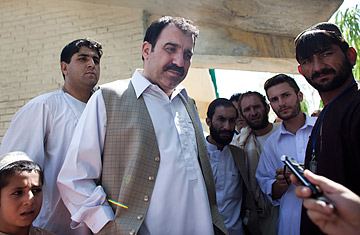
Ahmed Wali Karzai, the provincial council chairman for Kandahar and Afghan President Hamid Karzai's half brother, makes a statement after voting in the presidential elections August 20, 2009 in Kandahar, Afghanistan.
Hamid Karzai may be President of Afghanistan but his half-brother Ahmed Wali Karzai was popularly known as the President of Kandahar, the southern province that is the heart of Taliban country. At 11 a.m. on Tuesday, however, Ahmed Wali Karzai was assassinated at his home in Kandahar City. "The politics in Kandahar were complicated and now they will get even more complicated," says Fasheem Dashty, a political analyst and former newspaper editor in Kabul. Ahmed Wali, he adds, "had almost all the power in the province."
Ahmad Wali Karzai had been at his heavily fortified home, meeting with tribal elders, politicians and other members of the Kandahar provincial council, which he heads. According to council member Hajji Agha Lali Dastagiri, Karzai's longtime bodyguard Sardar Mohammad then asked for a private talk. After leaving the room, three gunshots were reported. Mohammad had apparently shot Karzai, wounding him in the head and chest. The guard was killed immediately by Ahmed Wali's security service. Karzai was rushed to the hospital but he died after heavy bleeding.
The Taliban are currently waging an assassination campaign against the government but rebel spokesmen were slow to take responsibility for the death, sometimes an indication that the Taliban were not involved. But they did eventually claim the killing in a statement to the foreign press. "Ahmad Wali Karzai has been killed by our faithful mujahed who was a member of our mujahideen brothers. [Sardar Mohammad] was hired to kill Ahmad Wali six months ago and eventually he had the opportunity to achieve his goal. This was one of the big projects in our Badr Operation," says Qari Yosuf Ahmadi, a Taliban spokesman, referring to the name the Taliban had given to its 2011 spring offensive.
But the delayed claim of responsibility — and its release to the foreign not the Afghan media — has led to widespread doubt among Afghans that the Taliban was really behind the assassination. Indeed, such doubts may further texture the President's relationship with the U.S. Ahmed Wali Karzai was key to controlling Kandahar, a role apparently valued enough by the CIA to keep him on the agency's payroll. Still, a number of high-ranking American military officers have tried in vain to remove Ahmed Wali Karzai from a position of power in Kandahar, citing allegations of his corruption, partiality to violence and involvement with the lucrative but illegal opium trade. President Karzai's increasingly combative stance against his erstwhile American allies, however, may now tinge his feeling about the killing. Says Dashty: "President Karzai will think there was possibly an overseas hand behind the assassination. He will not trust the U.S. This is mostly because the Taliban did not act very quickly in claiming the assassination and he was killed by his bodyguards. So, maybe it shows that there was another hand behind the assassination."
As yet unsubstantiated reports also had a personal grudge as a reason behind the bodyguard's attack on the President's brother. But whatever the motive for the killing, the murder has left a massive power vacuum in one of Afghanistan's most violent and important cities. Observers believed Karzai, who is younger than the president, was involved in much of that violence. He drew strong criticism for allegedly being closely involved in the illegal drug trade and for using intimidation and patronage to control Kandahar province from behind the scenes. Now it is uncertain who will fill the power vacuum.
